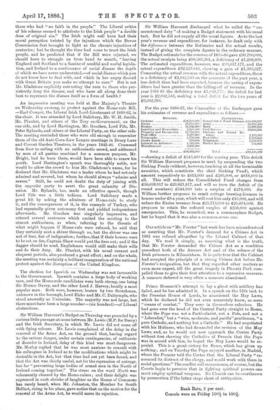For the year 1886-87, the Chancellor of the Exchequer gave
his estimates of revenue and expenditure as follows :—
REVENUE.
EXPENDITURE.
Customs
219,704,000 Consolidated Fund Charges £30,639,917
Excise 25,710,000 Army 18,233,200 Stamps 11,365,000
Navy
12,993,000 Land-tax and House-duty ... 2,929,000 Civil Service 18,008,691 Property and Income-tax .. 15 755,000 Customs and Inland
Re-
Post omm 8,270,000 venue 2,753,563 Telegraphs 1,730,000 Post Moo 5,218,955 Crown Lands 370,000 Telegraphs 1,845,510 Interest on Advances 1,165,000 Packet Service 735,663
Miscellaneous
2,900,000
Total 289,8&5,000 ' Total 590,428,499
—showing a deficit of £543,499 for the coming year. This deficit Sir William Harcourt proposes to meet by suspending the two Sinking Funds (without, however, touching at all the terminable annuities, which constitute the chief Sinking Fund), which amount respectively to £613,000 and £205,000, or £818,000 in all. This will reduce the Consolidated Fund charges from £30,639,917 to £29,821,917, and will so turn the deficit of (in round numbers) £544,000 into a surplus of £274,000. Sir William further proposes to remit cottage brewing-licences in houses under £8 a year, which will cost him only £16,000, and will reduce the Excise revenue from £25,710,000 to £25,694,000. He proposes to retain the reduced surplus of £258,000 against emergencies. This, he remarked, was a commonplace Budget, bat be hoped that it was also a common-sense one.


































 Previous page
Previous page